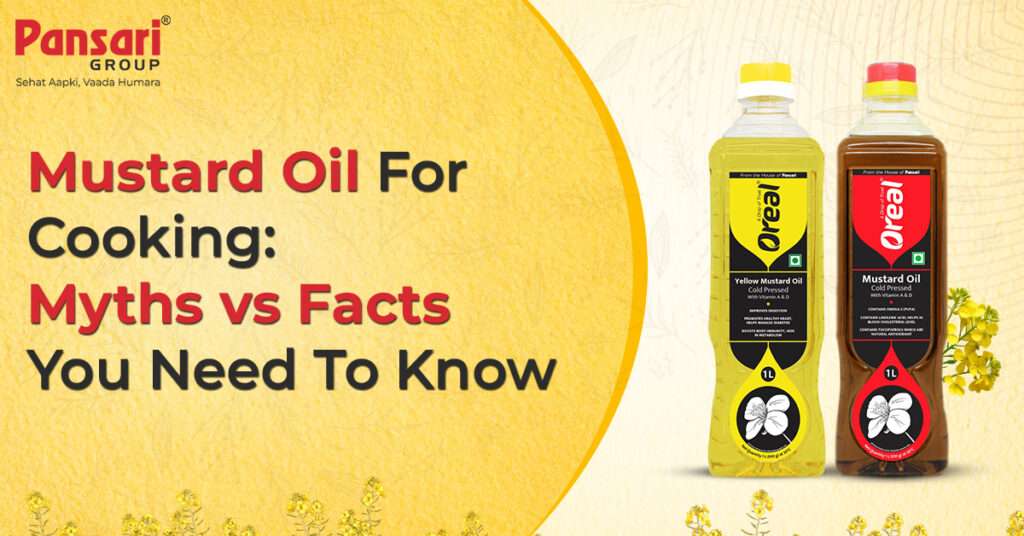Introduction
For centuries, mustard oil for cooking has been a constant in Indian homes. It finds extensive usage across different regional diets and is touted for its potent smell and medical advantages. Nonetheless, while its popularity may know no bounds, there are multiple myths regarding mustard seed oil for cooking that cast doubts about its safety and nutrient content. Is it good for health? Can it be consumed daily with no qualms?
On our blog, we bust myths and expose the truth regarding the best mustard oil to use while cooking so you can make a wise decision for your kitchen.
Myth 1: Mustard Oil is Unsafe for Cooking
Fact: Mustard Oil is Safe for Edible Use
One of the most common myths is that mustard oil for cooking is unsafe because it contains erucic acid. Although it is a fact that excessive erucic acid can be harmful to health. Indian mustard seed oil for cooking is controlled to make it safe. In nations such as India, Bangladesh and Pakistan mustard oil is common and safe if used in moderation. Indeed, it has been a reliable cooking medium for centuries and in addition to providing flavor, also carries some health benefits.
Myth 2: Mustard Oil Raises the Risk of Heart Disease
Fact: Mustard Oil Promotes Heart Health
Defying public perception, the best mustard oil for cooking is good for the heart. It contains monounsaturated and polyunsaturated fatty acids (MUFA & PUFA) that lower the levels of bad cholesterol and keep good cholesterol levels constant. Mustard oil also includes Omega-3 fatty acids that maintain cardiovascular function and reduce inflammation. According to research, the use of mustard seed oil on regular occasions can foster heart health instead of damaging it.
Myth 3: Mustard Oil is Suitable Only for Deep Frying
Fact: Mustard Oil is Versatile for Cooking
Though mustard oil for cooking is perfect for deep frying because of its high smoke point, it finds other applications too. Used in stir-frying vegetables, marinating meats, and making pickles, mustard oil provides a unique taste to food. Several Indian classical dishes depend upon mustard oil as the tempering oil for spices, providing each dish with its distinct flavor and fragrance. Both used raw in dressings and used for hot cooking, mustard oil is still an important, multifaceted ingredient.
Myth 4: Mustard Oil Induces Digestive Problems
Fact: Mustard Oil Facilitates Digestion
Few people think that eating mustard seed oil for cooking purposes can cause digestive issues. In actuality, mustard oil is antibacterial and antifungal and is helpful for gut health. It stimulates the secretion of digestive juices and due to its improving metabolism and smooth digestion property, it is a very good option for people suffering from slow digestion or acidity. Best mustard oil for cooking used in regular meals is helpful to keep the digestive system healthy.
Myth 5: Mustard Oil Loses Nutrients When It Is Heated
Fact: Mustard Oil Does Not Lose Nutrients Even Under High Heat
While other oils degrade when they are heated, mustard oil for cooking does not because of its high smoke point. This is to say that it does not lose its nutrients and essential fatty acids and is thus one of the best mustard oil for cooking. It also contains Vitamin E, a type of antioxidant that prevents the body from getting exposed to oxidative stress. Used for cooking, mustard oil in no way destabilizes its nutritional benefits but only enhances the value of the recipe as a whole.
Myth 6: Mustard Oil is Only Popular in India
Fact: Mustard Oil is Used Worldwide
While mustard seed oil for cooking is deeply rooted in Indian cuisine, its use extends beyond South Asia. It is widely used in countries like Bangladesh, Nepal and parts of Eastern Europe. Even in Western nations, mustard oil is gaining recognition for its health benefits and culinary potential. Many chefs around the world are experimenting with mustard oil in salads, sauces and gourmet dishes to bring out unique flavors.
Myth 7: Mustard Oil Has No Additional Health Benefits Than Cooking
Fact: Mustard Oil is Packed with Health Benefits
Besides being the finest mustard oil for cooking, mustard oil has various health advantages. It possesses anti-inflammatory effects to ease joint pain and stiffness in muscles. It also serves as a natural cure for cold and congestion when rubbed onto the chest. The antibacterial property of mustard oil for cooking kills bacteria and enhances immunity, making it a wonderful addition to a healthy lifestyle.
Myth 8: Mustard Oil is Too Strong in Taste
Fact: Mustard Oil’s Taste Can Be Controlled
It is shunned by some individuals for use in cooking since its flavor is deemed too strong. The strength of its flavor can nonetheless be toned down by heating it to the right level prior to use. Heating mustard oil to an ideal temperature serves to temper its pungency without destroying its vital nutrients. It is often required in recipes to be slightly smoked prior to cooking so that it may easily mix with other ingredients without overwhelming the dish.
Conclusion
Myths surrounding mustard oil for cooking have created unnecessary apprehensions regarding its safety and health impacts, but science and tradition both confirm that mustard seed oil for cooking is not just safe but highly beneficial for health as well. Ranging from heart-friendly fats to digestive health and varied uses in cooking, the best mustard oil for cooking is a must in every kitchen. By knowing the facts and adding mustard oil to your diet, you can relish its distinctive taste and many health benefits without any hesitation.
So the next time you hear false information about mustard oil for cooking, you’ll be aware of the facts. Welcome this golden oil and incorporate it into your healthy life!

